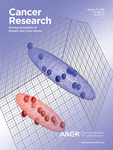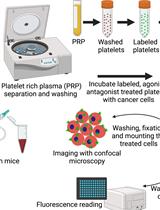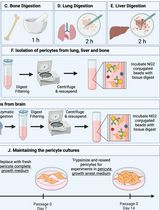- EN - English
- CN - 中文
Colon Cancer-associated Fibroblast Establishment and Culture Growth
结肠癌相关成纤维细胞的建立和培养生长
发布: 2016年04月05日第6卷第7期 DOI: 10.21769/BioProtoc.1773 浏览次数: 13710
评审: HongLok LungIsabel Cristiane da SilvaVanesa Olivares-Illana
Abstract
Cancer-associated fibroblasts (CAFs) are one of the major players in tumor-stroma crosstalk. Findings in experimental studies suggest important roles for CAFs in regulation of tumor growth, metastasis and drug response (Hanahan and Coussens, 2012). Furthermore, their clinical relevance is supported by new findings from tumor analyses, demonstrating the prognostic and response-predictive significance of CAF-derived markers or gene signatures (Berdiel-hacer et al., 2014; Finak et al., 2008; Navab et al., 2011; Paulsson and Micke, 2014). CAFs are a heterogeneous pool of cell subsets with distinct functions which needs to be better defined by their marker expressions. The development of a methodology for the establishment of fibroblast primary cultures derived from human colon tumors allowed us to characterize their functional and molecular properties (Herrera et al., 2013). In addition, the different molecular mechanisms through which CAFs affect tumor growth and metastasis are still to be clarified. Therefore, functional and molecular characterization of the cancer-associated fibroblasts is essential to fully understand their role in tumor progression.
Materials and Reagents
- 50 ml Falcon tubes
- Sterile disposable plastic Pasteur pipettes or sterile forceps
- 10 cm tissue culture dishes
- T-25 tissue culture flasks
- MW6 tissue culture plates (Jet Biofil, catalog number: TCP-011-006 )
- Human tissue samples (colon normal and tumor tissue)
- Dulbecco’s Modified Eagle Medium (DMEM) high glucose without L-glutamine (Lonza, catalog number: BE12-614F )
- L-glutamine (Lonza, catalog number: BE17-605E )
- NormocinTM (InvivoGen, catalog number: ANT-NR-2 )
- Penicillin/Streptomycin (Lonza, catalog number: BE17-602E )
- Amphotericin B (Carl Roth GmbH + Co., catalog number: 0246.1 )
- Gentamicin (Carl Roth GmbH + Co., catalog number: 0233.2 )
- Phosphate-buffered saline (PBS) (Lonza, catalog number: BE17-516F )
- Fetal Bovine Serum medium (FBS) (Biowest, catalog number: S181B-500 )
- Trypsin/EDTA (Thermo Fisher Scientific, GibcoTM, catalog number: 25200-056 )
- FBM & FGM-2 Bullet kit [Lonza, catalog number:( CC-3131 ) and ( CC-4126 )]
Note: FBM & FGM-2 Bullet kit is on the list of Fibroblast Growth Media (FGM) Kits] (Lonza, catalog number: CC-3132 ). - DMEM (see Recipes)
- FBS with high concentration of antibiotics (see Recipes)
- FBS with normal concentration of antibiotics (see Recipes)
Equipment
- Laminar flow tissue culture hood
- Scalpels
- 37 °C shaker
- 37 °C and 5% CO2 cell culture incubator
- Centrifuge
Procedure
文章信息
版权信息
© 2016 The Authors; exclusive licensee Bio-protocol LLC.
如何引用
Herrera, M., Herrera, A., Larriba, M. J., Ferrer-Mayorga, G., Herreros, A. G. D., Bonilla, F., Baulida, J. and Peña, C. (2016). Colon Cancer-associated Fibroblast Establishment and Culture Growth. Bio-protocol 6(7): e1773. DOI: 10.21769/BioProtoc.1773.
分类
癌症生物学 > 侵袭和转移 > 细胞生物学试验 > 细胞分离和培养
您对这篇实验方法有问题吗?
在此处发布您的问题,我们将邀请本文作者来回答。同时,我们会将您的问题发布到Bio-protocol Exchange,以便寻求社区成员的帮助。
Share
Bluesky
X
Copy link















